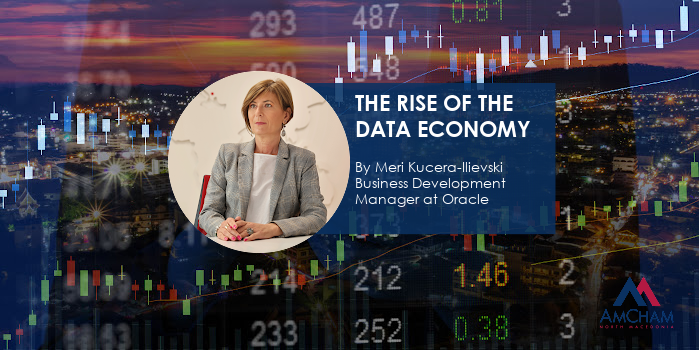Is data the new raw material of the 21st century? How can businesses benefit from it? Which regulations that safeguard its value and availability are on the rise and how the data economy has grown up? To find out, read the column with Meri Kucera-Ilievska, a member of our Digital Transformation Committee and a Business Development Manager at Oracle.
When Tim Berners-Lee declared data to be the “new raw material of the 21st century” back in 2011, he was perfectly describing the direction many economies were heading – from industry to insights and intelligence.
But in those ten years, data has broken rank with the orderly way many other commodities adhere to time-honoured economic principles. Unlike other raw materials, the more plentiful data has become the more valuable it has become. A raw material it may be, but it is coveted like precious metals and valued accordingly because of its power to transform businesses and inspire the innovations and insights that drive business – and will continue to do so for generations.
The soaring value of data
Some still find the valuations linked to something as intangible as data unfathomable, distasteful even. Others have been quick to predict another bubble waiting to burst. But in the most part, businesses have recognised the value of data is not only real and justified, but something that needs to be better recognised rather than doubted or called into question.
We at Oracle believe that the data a business owns can be the difference between spotting the next, best opportunity in their market or seeing a rival power past them. That data can help them identify opportunities to cut costs or open up new markets. It has a value that needs to be not just acknowledged but recorded and accounted for.
This is why data also has such a high tradable value and why data rich businesses are being bought, not for what they do but for what they know. It is why exchanges trading in data have become profitable businesses in their own right, in the same way exchanges developed to trade in things such as metals and currencies.
Regulations on the rise
In the same way business finances are carefully audited, detailed, recorded and regulated, the recognition of data is reaching a similar point of maturity. The financial good governance of a business is inextricably linked to its value, and the same can be said of data.
In this regard, we at Oracle are witnessing how data is maturing in a similar way to other raw materials. Its discovery and the creation of ever more efficient ways to mine it and collect it hinted at an inherent value. But its true value only started to be unlocked once people started creating things using the raw material. Now those uses of data have reached such a level of value to business, it is becoming subject to more stringent standards and controls to safeguard its value and availability while ensuring its responsible usage.
Setting standards with GDPR
The EU General Data Protection Regulation (GDPR), that came into effect on 25 May 2018, was the latest legislative move to standardise and safeguard the use of data. The GDPR has put in place regulation around the use and portability of personal data within the EU and its export from the region. It gave people more control over how their data is used and has put in place a clear, single set of rules relating to how data can be used.
It is of paramount importance that businesses operating within the EU, with EU partners and customers are aware of the implications and requirements of GDPR. Those businesses should be working already to ensure compliance – and while compliance may traditionally be a word synonymous with cost and complexity, or red tape and bureaucracy, rather than rolling their eyes at the mention of compliance, businesses would do well to consider the possibilities.
GDPR and similar regulations show the extent to which the data economy has grown up. It is also a timely piece of regulation because it acknowledges that data is moving faster, further and more freely than ever. These are trends businesses should be capitalizing upon. With less manual interaction required with data due to the rise of artificial intelligence and machine learning, a clear set of standards will help businesses establish a blueprint for automating processes across the business and around the world in a scalable, future-proof way, taking the opportunity to extract even greater value from that data to new levels.
Seizing the opportunity of the data economy
This opportunity is also being opened up by the maturation and greater sophistication of cloud computing at the infrastructure, platform and software level. The ability to collate and analyze data at incredible volumes and speed has been enabled by the pervasiveness of cloud technology and its ability to connect once disparate systems, processes and silos of data via common, secure platforms.
We at Oracle believe that it is no coincidence the value of data has risen exponentially with the wider end-to-end adoption of cloud technologies. If data is the raw material that will drive the businesses and innovations of the future then a connected cloud is the going to be the means of extracting and fully exploring the potential and value of that raw material.
Building on this, businesses should view GDPR as an opportunity to better align their organizations. Data protection regulation will only become more nuanced, and a clear view of how data moves across the business will be critical to staying on top of change – in addition to helping companies work more efficiently. It may be enough for now to merely comply with GDPR, but by taking a long term view companies can stay ahead of the curve and focus on differentiating themselves in a competitive marketplace.

